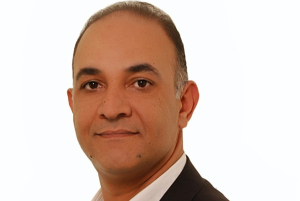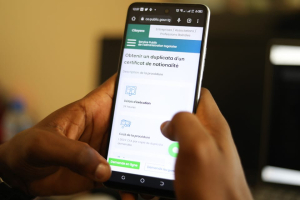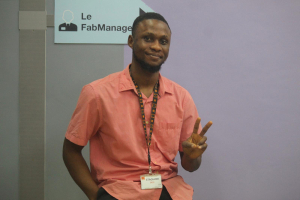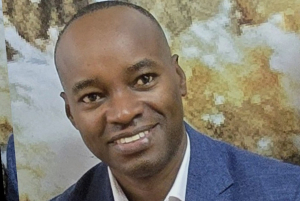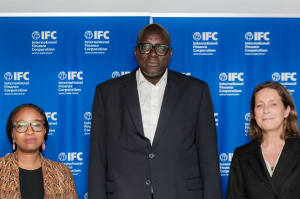Gabon Partners With UAE’s Presight to Deploy AI in Public Administration
- Gabon signed a memorandum of understanding with Presight, a subsidiary of UAE-based G42, to support digital government reforms.
- The partnership focuses on artificial intelligence, advanced analytics, and big data for public administration.
- Presight already works with African governments and trades on the Abu Dhabi Securities Exchange.
Gabon’s Ministry of Digital Economy signed a memorandum of understanding with Presight on Friday, February 6, on the sidelines of high-level discussions held in Abu Dhabi. Presight operates as a subsidiary of UAE-based technology group G42. The agreement aims to support the digital transformation of public administration and several strategic state services.
À Abu Dhabi, le Gabon a signé trois Mémorandums d’Entente stratégiques dans les secteurs minier, numérique et logistique.
— Présidence de la République Gabonaise (@PresidenceGA) February 6, 2026
Ces accords s’inscrivent dans la vision du Président de la République, S. E. @oliguinguema, visant à accélérer la transformation économique et renforcer… pic.twitter.com/hkZcUEH6bP
Authorities said the cooperation will focus on deploying artificial intelligence, advanced analytics, and big data solutions. The partnership seeks to improve public data management, optimize administrative services, and strengthen decision-support capabilities. Governments typically use such solutions to modernize state information systems, automate selected processes, and improve service delivery to citizens and businesses.
This partnership comes as digital transformation ranks among Gabon’s top policy priorities. DataReportal said Gabon recorded about 1.8 million internet users in 2025, representing nearly 71.9% of the population, while mobile connections exceeded 3.27 million. However, public service digitalization and nationwide data governance remain key challenges for improving administrative efficiency and supporting economic diversification.
Presight operates across multiple markets and has already formed partnerships with governments and institutions in Africa, including in Gambia and Côte d’Ivoire, on projects related to artificial intelligence, security, and public data management. The company trades on the Abu Dhabi Securities Exchange and positions itself as a major exporter of AI solutions developed in the United Arab Emirates.
With this memorandum, Libreville and Presight have laid the groundwork for cooperation expected to take shape in the coming months. Future operational agreements will define project scope, implementation modalities, and associated investments, as Gabon seeks to build a more coherent digital strategy aligned with its public sector modernization priorities.
Samira Njoya
Mohammed Benchaa Centralizes Workplace Learning With Somu Raqami
- Algerian entrepreneur Mohammed Benchaa co-founded Somu Raqami to centralize and automate corporate training management.
- Founded in 2022, the platform unifies onboarding, procedures, and skills development into a single system.
- Somu Raqami uses data and reporting to help organizations track performance and improve learning outcomes.
Mohammed Benchaa is an Algerian entrepreneur and a graduate of Kasdi Merbah University in Ouargla. He co-founded and leads Somu Raqami, an online solution dedicated to modernizing and centralizing internal training within organizations. The platform allows companies to track learning activities, develop skills, and improve team performance in a structured way.
Founded in 2022, Somu Raqami delivers a unified system that manages and monitors all training activities within an institution. The system covers new employee onboarding, procedure updates, and continuous skills development. The solution automates many training-related tasks, which saves time for teams and makes learning paths more efficient and professional.
The platform adapts to each organization both visually and functionally to remain consistent with its identity and specific needs. It brings all corporate training categories into a single space, thereby preventing the dispersion of content and tools.
Somu Raqami also improves learner monitoring through detailed data and reports that analyze progress, engagement levels, and individual results. These insights help managers assess program effectiveness, adjust content, and manage training as a strategic performance driver.
In parallel, Mohammed Benchaa works as an independent digital marketing specialist. He also serves as head of marketing at Somu Academy, an education platform launched in 2024 that offers recorded online courses focused on freelance careers, including marketing, design, and programming.
This article was initially published in French by Melchior Koba
Adapted in English by Ange Jason Quenum
Tech Entrepreneur Samir Tamri Launches Platform to Track Employee Experience in Real Time
-
Positeams, founded in 2020, enables companies to track employee experience, motivation and needs through regular and customizable surveys.
-
The platform provides data-driven insights, including trend analyses, word clouds and anonymous chat feedback, to guide HR and leadership decisions.
-
Positeams also recommends action plans and training content to help managers implement organisational change.
Companies face a growing need to understand the real experience of their teams. Samir Tamri uses technology to provide a precise and practical response to this challenge.
Samir Tamri, a Moroccan computer scientist and tech entrepreneur, is the founder of Positeams, an online platform that helps companies understand their employees and strengthen daily engagement through a simple and accessible tool.
Tamri launched Positeams in 2020. The platform allows companies to deploy regular or customized surveys to track employee experience, motivation and needs over time. Its purpose is to offer management and HR departments a clear and continuous view of workforce sentiment without complex procedures.
Positeams relies on a rigorously developed set of questions designed to deliver reliable feedback across multiple aspects of professional life. The platform analyzes responses to identify significant trends and provide companies with actionable interpretation.
The company also offers feedback analyses that highlight recurring themes, including through word clouds that display the most frequently cited topics. An anonymous chat tool enables employees to express themselves freely, ensuring continuous and authentic internal listening.
Beyond collecting feedback, Positeams recommends concrete actions to address identified needs. The platform allows companies to structure action plans, monitor progress and access online training resources designed to support managers in driving organizational change.
Alongside Positeams, Samir Tamri serves as founder and CEO of North African Game Distributors (NAGD). Launched in 2008, the company operates in the distribution, development and publishing of video games and is considered a leading player in Morocco’s touchscreen gaming market.
Tamri created his first company, Arabium.com, in 2001 as a community portal for Arab singles living in the United States.
He holds a bachelor’s degree in computer science from Drexel University, obtained in 1999. He began his career in 1997 at Unisys as a software engineer.
Between 2001 and 2015, he worked as a senior software engineer at AMI Entertainment Networks, which specializes in innovative entertainment solutions. From 2017 to 2018, he served as chief technology officer at Taxi Rouge, a Moroccan e-mobility start-up.
This article was initially published in French by Melchior Koba
Adapted in English by Ange Jason Quenum
Charles Nelson Kabwende Drives DRC Digital Sovereignty Push
-
Charles Nelson Kabwende founded Africa Tech Invest to connect investors with the Congolese startup ecosystem.
-
The initiative focuses on public sector modernization and the digital sovereignty of African states.
-
Kabwende holds a dual role as a private entrepreneur and the CISO for the DRC’s tax authority.
Charles Nelson Kabwende operates as an entrepreneur and investor from the Democratic Republic of Congo (DRC). He founded Africa Tech Invest as a dedicated forum for technological innovation and investment on the continent.
Africa Tech Invest established itself as a major event for technology promotion following its inception in 2022. The organization emphasizes the modernization of the public sector. It defends the idea that technology improves public services structurally. The platform also supports entrepreneurship and strengthens the digital sovereignty of African states.
The organizers host the event in Kinshasa at either the Cultural Centre or the Financial Centre. The forum spans one day. It features conferences, executive panels, and keynotes. The schedule includes African startup contests, hackathons, and cybersecurity workshops such as "Capture the Flag" challenges. The Cultural Centre of Kinshasa hosted the 2025 edition on June 25.
Africa Tech Invest functions as a strategic meeting point for the Congolese startup ecosystem. The fair connects entrepreneurs, investors, and public decision-makers. Additionally, the organizers manage a startup competition that values African technological solutions within edtech and artificial intelligence. The initiative aims to surface projects that attract regional and international investment dynamics.
Charles Nelson Kabwende currently serves as the President of ANEMONE. This company manages digital identity for enterprises. He also directs information systems security at the General Directorate of Taxes of the DRC.
He graduated from the Beihang University of Aeronautics and Astronautics. He obtained a bachelor's degree in electronic and computer engineering there in 2016. He also holds a master's degree in business informatics from Riga Technical University in Latvia, which he received in 2021.
His professional path led him to Premise Data in Kinshasa in 2018. He worked there as a country support specialist. He became a project manager at Kelony in 2019. This organization specializes in artificial intelligence. He subsequently served as a consultant in IT, cybersecurity, and blockchain at World Elite Consulting between 2021 and 2022.
This article was initally published in French by Melchior Koba
Adapted in English by Ange Jason, Quenum
Alessandro Scarcella Builds AI Assistant to Streamline Lawyers’ Workflows
-
Adjunct, founded in 2024, develops an AI assistant that automates legal research and compliance tasks for South African lawyers.
-
The platform identifies relevant legal documents from public databases and, when authorized, from internal firm resources, then produces structured, source-referenced outputs.
-
Co-founder and CEO Alessandro Scarcella previously worked as a data scientist and machine-learning engineer in several South African tech companies.
He targets a core segment of legal work through artificial intelligence. His innovation aims to transform how legal professionals access information and manage case files.
Alessandro Scarcella, an entrepreneur and artificial intelligence engineer based in Johannesburg, serves as the co-founder and chief executive officer of Adjunct, a start-up that develops an AI assistant for South African lawyers.
Adjunct, which Scarcella and chief operating officer Julia Ramsunder founded in 2024, supports legal practitioners in their research, their compliance duties and their management of judicial procedures. The platform primarily addresses professionals operating in South Africa and uses legislation and court decisions drawn from the national legal framework.
The tool automates a share of routine work inside law firms or legal departments, and it frees time for analysis and strategic advice. It does not replace legal reasoning, and it operates as a support system for information processing.
Users start by submitting a question in natural language. The request may be a precise query, a list of issues or notes taken during a meeting. Based on this initial input, the assistant may ask follow-up questions to clarify the need and direct the search.
Once the request is defined, Adjunct identifies relevant documents in public databases and, when authorized, in the internal resources of a firm or organization. The tool then generates a structured response grounded in these sources and returns it with precise citations to allow verification.
The platform connects to several types of legal content, including national legislation and case law. The company plans to integrate additional categories, such as provincial laws, regulations and local administrative orders.
Scarcella graduated from the University of Cape Town, where he earned a bachelor’s degree in finance in 2014 and a master’s degree in machine learning and statistics in 2016. He built his career in several technology companies before launching his start-up.
He joined Cortex Logic in 2017 as a data scientist and became a machine-learning engineer in 2019. He moved to the online delivery service Mr D Food in 2022, where he worked as a data scientist until 2024.
This article was initially published in French by Melchior Koba
Adapted in English by Ange Jason Quenum
Togo Adds Three New Digital Administrative Procedures to National E-Service Platform
-
Togo integrates three new procedures online: renunciation of nationality, reinstatement of nationality, and modification of patronym or matronym.
-
The national portal now centralises 101 digital public services, including passports, residency cards and nationality certificates.
-
The UN’s 2024 EGDI report ranked Togo 161st out of 193, highlighting a major digitalisation gap the government actively seeks to close.
Togo aims to digitise all public services in the coming years to simplify administrative processes and improve access for all citizens. The addition of new online procedures confirms the progress of this nationwide transformation.
Togo continues to modernise its administration by adding three new services to the national portal service-public.gouv.tg. Citizens can now complete online the renunciation or reinstatement of Togolese nationality and the modification of their patronym or matronym.
The Ministry of Justice and Human Rights leads these digital procedures as part of a methodical modernisation effort. The platform now enables users to complete entire processes remotely: application submission, real-time tracking and receipt of decisions. Officials strengthened the national digital one-stop shop to centralise administrative services and improve accessibility.
This deployment comes as Togo accelerates the digitalisation of administrative services. In recent months, the national portal added major services, including applications for nationality certificates, passport renewals, residence permits, criminal records, construction permits and other formalities. With these additions, the platform now offers 101 online services.
The integration of the three new procedures addresses key priorities: reducing citizens’ travel, increasing procedural transparency, shortening processing times and improving administrative efficiency. The expansion also strengthens administrative inclusion by enabling citizens—especially those far from urban centres—to access essential services without geographic constraints.
This acceleration of digital transformation occurs as Togo works to close a significant gap in public-service digitalisation. The 2024 UN E-Government Development Index (EGDI) assigned Togo a score of 0.3920, ranking the country 161st out of 193, a result that underscores the scale of the challenges ahead. The progress achieved in recent months demonstrates the government’s determination to modernise public administration, improve accessibility and integrate Togo’s public sector into the digital era.
This article was initially published in French by Samira Njoya
Adapted in English by Ange Jason Quenum
Cameroonian Developer Awahnji Jean Awah Builds AI Career Through ODC–Coursera Training
-
Awahnji Jean Awah pursues a Master’s in Data Science and AI while completing extensive multi-vendor certifications across IBM, Meta, Google, AWS, Azure, Red Hat and others.
-
Orange Digital Center (ODC) trains him through its partnership with Coursera, signed in April 2024, offering hands-on programmes and continuous mentorship.
-
He applies his skills in freelance development and AI practice, gaining better-paid missions, higher responsibilities and increased client trust.
Cameroonian developer Awahnji Jean Awah builds digital solutions and moves toward cloud technologies and artificial intelligence. He pursues a Master’s degree in Data Science and Artificial Intelligence at the Institut universitaire de la Côte, where he acquires scientific and practical foundations in these fields.
Alongside his academic programme, he trains himself through web development, data-analysis projects and website creation for clients. This autonomous work allows him to test his skills against concrete business needs.
With the goal of becoming “an end-to-end AI engineer capable of designing high-impact digital solutions,” Awahnji joins the Orange Digital Center (ODC), Orange’s technology-training hub. He follows several programmes created through an April 2024 partnership between ODC and Coursera, which he discovered on social media.
He completes certifications from IBM (DevOps, Software Engineering, Machine Learning, AI Developer), Meta (Back-End and Front-End Developer), Google (UX, Data Analytics, Project Management), AWS (Cloud Architect), Microsoft Azure (Developer), Red Hat (Kubernetes/OpenShift), Microsoft (Project Management, Cloud Support), Scrum Master, and additional technical modules.
This training path, which began in July 2024 and continues throughout 2025, relies on an intensive schedule that combines practical workshops, ODC staff mentoring and professional simulations. In an interview with We Are Tech Africa, he describes the experience as “rich, practical, intuitive, well supervised by the ODC staff.”
In parallel, he works as a freelance developer and AI practitioner, a framework that allows him to apply his newly acquired skills. He says that the certifications have “strengthened my portfolio, improved my technical autonomy, increased my opportunities for freelance missions and enhanced my professional credibility.”
He states that they have transformed his “skills, strengthened my confidence and given me the tools needed to turn my ideas into real and impactful solutions.” He adds that this evolution results in “better-paid missions, more responsibilities and greater client trust.”
Looking ahead, Awahnji plans to “become a certified AI and cloud engineer, design impactful AI tools, develop scalable cloud solutions and, ultimately, create or join a technology start-up.”
This article was initially published in French by Melchior Koba
Adapted in English by Ange Jason Quenum
Togo’s Edomatch Targets Faster Hiring With Mobile Recruitment Platform
- Edomatch records more than 50,000 downloads on Android.
- The start-up launched the platform in 2024 in Lomé.
- The app enables direct job applications and employer preselection through a single mobile interface.
Edomatch disrupts traditional recruitment in Togo by offering employers and job seekers a mobile platform designed to simplify hiring. The application aims to provide a fast, accessible and low-cost solution for both sides of the labor market.
Edomatch is a digital tool that allows any job seeker—whether full-time, part-time or for temporary assignments—to apply online through its website or mobile app. The Lomé-based start-up launched the service in 2024 under the leadership of founder Chris Koehler.
“Our mission is to simplify and humanize the job search while helping companies find talent efficiently,” the start-up states. The application runs on iOS and Android, and it has already surpassed 50,000 downloads on the Play Store.
The platform enables users to create profiles, review available offers and apply in a few clicks. Companies can publish job postings and preselect candidates directly from the app. This structure reduces administrative steps and accelerates recruitment processes.
Edomatch differentiates itself through its broad sector coverage, which includes commerce, logistics, services, construction and hospitality. The app uses geolocation tools that allow candidates to identify job postings near their homes. This feature supports local employability and reduces unnecessary travel.
The platform also facilitates professional integration for young people, inexperienced candidates and individuals from disadvantaged backgrounds. For companies, the application reduces time and resource costs by eliminating the need to publish across multiple channels, sort large volumes of CVs or rely on expensive intermediaries. Firms can quickly identify relevant profiles and access candidates available for immediate hire.
By combining an accessible mobile interface, a large pool of job listings and an inclusive orientation, Edomatch has the potential to transform Togo’s labor market. In an economy marked by informality and high unemployment, the platform could become a key tool for professional integration by making recruitment more transparent, efficient and equitable.
This article was initially published in French by Adoni Conrad Quenum
Adapted in English by Ange Jason Quenum
Rwandan Entrepreneur Migambi Builds Data-Driven Systems for Public Institutions
- evolve, founded in 2014 by Richard Migambi, supports public institutions and companies with structured data strategies.
- The firm designs locally developed digital solutions that organise data flows and build analytical dashboards.
- Migambi built his career across the UK and Rwanda, including work for Hasbro Europe, the Rwandan Ministry of Finance and the World Bank.
Richard Migambi uses structured data to improve the functioning of organisations. Through his solution, he proposes a new way of organising information to strengthen decision-making and the implementation of policies.
Migambi, a Rwandan entrepreneur in public-sector digital transformation, is the founder and chief executive of evolve, a Rwandan company that helps organisations use structured data to improve decisions and support innovation.
evolve, founded in 2014, presents itself as a digital-transformation agency and technology partner working with companies, public administrations and organisations engaged in digital reforms. The company develops locally designed technological solutions that respond to needs identified in the field by mobilising national expertise and an impact-driven approach.
The firm builds its value proposition around a “data strategy” offering aimed at organising and exploiting the potential of internal data. evolve supports clients as they define adapted data governance, structure information flows and deploy analytical dashboards that convert data into management tools.
The company operates across the entire data-management cycle, including collection, security, organisation and sharing. This structuring aims to make information reliable, accessible and usable for teams while reducing systemic fragmentation that often slows digital-project efficiency.
evolve also develops customised dashboards and analytical environments tailored to each organisation. By making key indicators visible and usable daily, the tools enable faster and more coherent decision-making aligned with operational priorities.
Before founding evolve, Migambi created 37 Software Solutions in 2008 in the United Kingdom, a software-development and consulting agency for small and medium-sized companies seeking to structure their e-business strategies. He also worked there as a software developer until 2014.
He earned a bachelor’s degree in database technologies in 2006 from the University of Portsmouth and a master’s degree in software engineering in 2010 from the University of Southampton.
Migambi began his career in 2002 in the data-processing department of Velindre NHS Trust Hospital in Cardiff, Wales. In 2003, he joined Churchill Insurance Company as a customer adviser. In 2011, he became a software developer at Hasbro Europe in London, the international toy and entertainment company.
From 2015 onward, he served as electronic procurement project manager at the Rwandan Ministry of Finance. Between 2021 and 2023, he worked as a consultant on the implementation of Burkina Faso’s electronic public-procurement system for the World Bank.
This article was initially published in Frenbch by Melchior Koba
Adapted in English by Ange Jason Quenum
Orange Mali to Roll Out 300 New 4G Sites Under €80M IFC Loan
-
IFC grants €80M loan to Orange Mali to expand digital infrastructure
-
Funds to add 300 4G antennas, connect 300,000 homes, promote solar energy
-
Project backs digital inclusion, targets rural areas and women’s participation
The International Finance Corporation (IFC), the World Bank’s private sector arm, announced on Monday, Nov. 17, an 80 million euro ($92.7 million) loan to Orange Mali SA. The funding will help modernize Mali’s telecommunications infrastructure, expand broadband coverage and improve access to digital financial services.
“This partnership strengthens our commitment to digital inclusion and broader telecom access. With the IFC’s support, we will extend network coverage, improve its resilience and enable more Malians to benefit from the opportunities of the digital economy,” said Aboubacar Sadikh Diop, CEO of Orange Mali.
The financing package includes 50 million euros from the IFC’s own resources and 30 million euros provided by the West African Development Bank (BOAD). The investment will support the installation of 300 new 4G antennas and the rollout of a fiber network that will connect around 300,000 households and small businesses, nearly half of them in rural areas.
The project also features digital training programs aimed at having women represent 70 percent of participants by 2032, contributing to greater digital inclusion. Orange Mali will also replace its diesel generators with solar systems, a shift expected to cut annual CO2 emissions by more than 8,000 tonnes.
This investment is the first made under the partnership signed between the IFC and Orange Middle East and Africa (OMEA) during the Africa CEO Forum in Abidjan in May 2025. It supports Mali’s Mali Digital 2020 strategy and the World Bank Group’s Digital Economy for Africa initiative, which aim to use technology to create jobs, strengthen resilience and promote sustainable development.
Mali has prioritized rural connectivity in recent years. A separate agreement between Intelsat and Orange Mali recently enabled 360,000 residents in remote areas to gain internet access. Still, significant gaps persist. According to a DataReportal report published on Nov. 8, Mali had 8.91 million internet users at the end of 2025, representing 35.1 percent of the population.
The new funding is expected to allow Orange Mali, the country’s leading operator with more than 12 million subscribers, to accelerate network expansion, improve connectivity in underserved regions and broaden digital access. It will also support the growth of online services already available in Mali, including telemedicine, digital education and mobile financial services.
Samira Njoya




